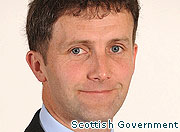Today MSPs are debating a Bill to tackle human trafficking which does not criminalise the purchase of sex, despite calls from churches, faith groups and other organisations.
In February, leading figures within the Church of Scotland, alongside Roman Catholics, Anglicans, Muslims and Sikhs wrote to First Minister Nicola Sturgeon, urging Holyrood to outlaw buying sex.
And other organisations such as Community Safety Glasgow and Abolition Scotland called for the change in their written submissions to the Justice Committee, which examined the legislation.
Wrong vehicle
But the committee said in its report that although the issue “may be worthy of further review and detailed consultation”, the Human Trafficking and Exploitation Bill was “not the correct vehicle” to deal with the matter.
The report added: “The criminalisation of the purchase of sex would have implications beyond the matters dealt with in this Bill.”
The Justice Secretary Michael Matheson, who introduced the legislation, intends to meet with campaigners on both sides of the argument before Stage 2 of the Bill.
Maximum penalty
The committee backed the general principles of the Bill, ahead of today’s debate in Parliament.
The Human Trafficking and Exploitation Bill would for the first time create a specific offence of human trafficking, with a maximum penalty of life imprisonment for offenders.
Currently in Scotland, buying sex on the street and keeping a brothel are illegal, whereas campaigners are calling for the purchase of sex in any circumstance to be criminalised.
Northern Ireland
Last year, a Bill outlawing the purchase of sex was passed by the Northern Ireland Assembly, making the Province the first part of the UK to bring in such legislation.
Lord Morrow’s Human Trafficking and Exploitation Bill also makes provisions for statutory victim care and child trafficking guardians, aimed at strengthening support services.
The DUP Peer told the Assembly his Christian faith was his motivation for bringing forward the legislation.

